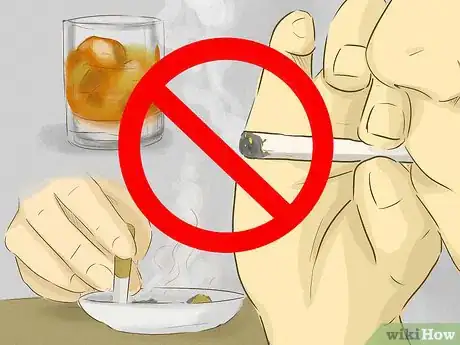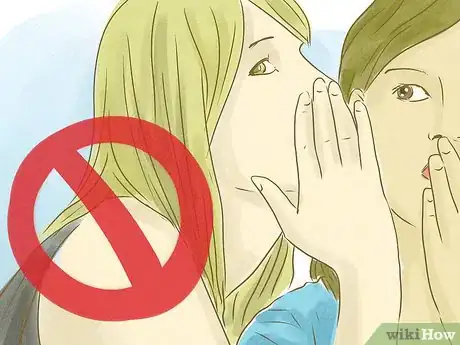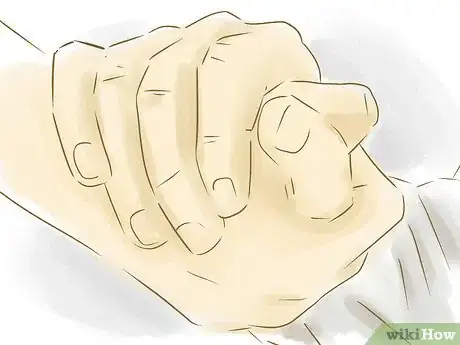X
This article was co-authored by Paul Chernyak, LPC. Paul Chernyak is a Licensed Professional Counselor in Chicago. He graduated from the American School of Professional Psychology in 2011.
There are 11 references cited in this article, which can be found at the bottom of the page.
This article has been viewed 57,916 times.
Welcome, little ones, It's not easy being a teenager. Your body is changing and your social life is developing. Many people go through difficult situations as teens. However, being a teenager can be fun if you learn to take care of yourself, form healthy relationships, and cope with the many new things coming your way.
Steps
Part 1
Part 1 of 3:
Taking Care of Yourself
-
1Love yourself. Gain confidence in who you are. Life will be much easier when you have the courage to appreciate your self-worth. This doesn't mean becoming self-absorbed. It means taking care of yourself and respecting that you are a precious being like everyone else. [1]
- Look for things you like about yourself. Whether you are looking in the mirror or just thinking about your personality, focus on the positive.
- Be kind to yourself. Do something you enjoy or eat a special meal once in awhile.
- Be proud of your personality and preferences. From nerd to jock, from athletic to bookworm, you are unique and it's important to honor the expression that fits you rather than squeezing yourself into someone else's expectations.
-
2Stay focused on your studies. Your main responsibility as a teen is probably schoolwork. While there are many social and emotional distractions, remember that your education is meant to help you in the future.
- Develop good study habits. Long hours of study don't necessarily show results unless you're studying wisely. Study in a place where you will be most productive and with minimal distractions. Use flashcards, memory games, or review sheets to reinforce new information. Remember to take breaks and stay positive![2]
Advertisement -
3Maintain a balanced diet. Keep your mind and body active by eating healthy foods every day. Your body is still growing, and you need to nourish it along the way. A balanced diet includes a large number of vegetables, fruits, proteins, and grains. Avoid processed foods, sugary drinks, and sweets. Remember to eat your three meals per day, especially breakfast. [3]
- Do not overeat. Overeating, especially eating junk foods, can cause health problems in the future. If you have a problem with overeating or weight gain, seek help from a doctor or nutritionist.
- Do not starve yourself. Skipping multiple meals to lose weight is a sign of anorexia nervosa. Anorexia is a serious eating disorder that poses many health risks. If you or someone you know struggles with anorexia, seek counseling immediately.[4]
- Bulimia nervosa is another common eating disorder, especially among teenaged girls. Bulimia is characterized by overeating and then rushing to a bathroom to vomit all that was consumed. This, too, is a psychological disorder that requires serious attention. [5]
-
4Exercise regularly. Teenagers should for about one hour per day. You may have to participate in a physical education class at school, but there is more fun to be had! Adding a physical activity after school can nicely balance out your day. Search for an activity that suits your interests. [6]
- Consider joining a sports team or taking a dance class. Any type of body movement will decrease your chance of suffering from ailments in the future. Exercise also releases a chemical in your brain called endorphins. Endorphins will keep you in a positive mood!
-
5Get enough sleep. Between school, homework, extracurriculars, and socializing, it can be a challenge to get enough rest. A healthy amount of sleep helps with performance at school, social interactions, and the ability to handle stress. Make an effort to sleep for at least eight to ten hours each night. [7]
- Develop regular sleep patterns. Research shows that teens often develop irregular sleep patterns like staying up late during the week and sleeping in on weekends. This irregularity can cause poor sleep quality in the long run.[8]
-
6Learn to regulate your emotions. There are a decent amount of steps you can take when you're feeling overwhelmed by emotion or sad and lonely. Here are some suggestions for how to cope with a feeling that makes you upset:
- Name the emotion. Think about your emotions and try to name them. Say, "I'm feeling jealous right now," or "I feel sad, but I'm not sure why."
- Write about the emotion. In your diary or even in a note on your cell phone, write down the emotion, how you're feeling, and what's going on in your life.
- Understand the circumstances behind a feeling. What caused you to feel this way? Was it unexplained, or did something happen in your life to cause this emotion?
- Calm yourself down. Whether you want to take a walk, call a friend, do some deep breathing, or watch a funny cat video, find a way that helps you become less distraught and overwhelmed.
-
7Try new things. Find some activities that you enjoy. This will give you something to look forward to during the day. Your school or community may offer fun evening classes. Try joining a chess club or taking a cooking class. [9]
-
8Have fun! Make the most of your teen years. Enjoy life while you are young and have fewer responsibilities. Teenage years might be rough to handle, but it's quite possible that you will miss this carefree and youthful time once you're older.
Advertisement
Part 2
Part 2 of 3:
Developing Good Relationships
-
1Sympathize with your peers. Your peers have hopes, worries, and fears, just as you do. They have an urge to do something useful in the world, just as you do. Some are nice, caring, and supportive, and will understand you. Those who aren't very friendly may have reasons for that. They may feel shy, scared, or annoyed at the world. It's important to realize that people can be mean because of insecurities or a desire to keep pain at bay. Don't assume the worst in others.
- Put yourself in your peers' shoes. This may help you understand others better. For example, if you notice that someone never seems to do well on tests and is always in a bad mood in class, try to imagine how you would feel in that situation. You may also feel frustrated in an environment in which you do not succeed.
-
2Meet new people. Making friends can be challenging, especially at a new school. Be open to talking to new people. Ask questions about them and share interesting things about yourself. It takes time to make close friends, but the more time you spend together, the closer you will become. [10]
- Join a club or activity. Go with a new friend or show up by yourself. Either way, you are bound to spend time with people and build friendships.
-
3Keep your good friends. Friendship and socializing are an important part of being a teen. Maintain friendships that make you feel supported and comfortable in your own skin. Supportive friends will encourage you to be the best version of yourself. Avoid friends who pressure you to do things that don’t feel right for you.
- Good friends spend time together, they help each other, and they can trust each other. For example, a good friend will enjoy going to your house or seeing a movie on the weekend. He or she will be glad to help you with your homework if you are struggling. A good friend will listen to your problems and won’t talk about sensitive issues behind your back.
- Maintain friendships by making an effort to see each other. Sit together at lunch or join the same club. If you don’t go to the same school, call each other on the weekends. Send updates via email or text during the week to show that you want to stay in touch.
-
4Manage peer pressure. Peer pressure is when you are influenced to do something because your friends are doing it or because your friends ask you to participate. This can have both a positive and negative effect. Before making a move, think about if it is right for you. What are the possible outcomes? What is the best or worst thing that could happen?[11]
- Don't do something that makes you feel uncomfortable. Use some non-confrontational phrases if you are pressured to do something that you know feels wrong. Try saying, “Hey, I don’t think I want to get into this. It’s just not for me.”
-
5Maintain a relationship with your parents. Getting along with parents can be challenging as a teen. Try doing an activity together that you both enjoy. Play a sport or watch a movie together. Help out around the house or offer to drive your siblings somewhere. Parents will appreciate it when you make an effort to help them. [12] Helping out also shows maturity and can help build trust between you.
- Avoid ugly fights. Parents also struggle with adolescent years. They may try to restrict your actions or shorten the time spent with your friends. Try to reason with them logically instead of yelling to get what you want. [13] Compromising with your parents is valuable skill to develop.
-
6Develop healthy romances. People often start dating in their teens. There can be a lot of pressure to have a boyfriend or girlfriend. Families differ on what is appropriate as far as dating. If you are interested in someone, try getting to know them to test the waters. See if going on a date is appropriate and mutually desired.
- Engage in safe sex. Not all teens are ready for sex. Avoid people who pressure you into having sex if you wish to abstain. If you do feel ready to have sex, be aware of the physical and emotional consequences. Sex can be fulfilling, but it can also be an emotional burden at a young age. Additionally, sex can result in the passing of sexually transmitted diseases (STDs) that compromise your health. Sex can also result in pregnancy. Always use condoms correctly when engaging in oral, vaginal, or anal sex.
- Make sure that you and your partner are respectful and loving to one another. Your partner should never be physically or emotionally abusive, and you should never feel that your partner has any control or power over you. Read this article to see if your relationship could be categorized as abusive.
Advertisement
Part 3
Part 3 of 3:
Coping with Difficult Times
-
1Develop self-confidence. Social life is challenging at any age. Develop a healthy sense of self to get through difficult situations. Remember to focus on the positive aspects of who you are and avoid criticizing yourself. [14]
- Brush off awkward mistakes. Mistakes are lifelong occurrences. If you feel you’ve embarrassed yourself, don't freak out or overreact. Just be calm. Most people are thinking about themselves anyway. There are many ways to deal with embarrassment.
- For example, if you fall in the cafeteria or make a bad joke, try laughing it off. You might say, “Oh, that was weird” and keep moving. You also might be overestimating how much people are actually looking at your or paying attention to you. It's possible that no one even noticed that you fell in the cafeteria, and your bad joke will probably be forgotten by the end of the day.
-
2Know the effects of drugs and alcohol. Teens are often exposed to drugs and alcohol at some point. There is a lot of peer pressure to participate in drinking and drug use. Unfortunately, these tend to have very negative consequences, especially when used at a young age. Avoid drugs and alcohol. Recreational drug use is illegal, and it is illegal for teens to drink alcohol. [15]
- Do not over-consume. If you are going to drink alcohol, be careful not to binge drink. This is when you drink a large amount of alcohol (about three to four drinks) in about an hour. This will raise your blood alcohol level and can be very dangerous, resulting in hospitalization and even death. [16]
- Learn your facts. If you do use drugs, know the effects, side-effects, likelihood of addiction, and risks involved. Many drugs are illegal because they can be highly addictive and result in deadly overdose. [17]
-
3Avoid drama. It happens that some people thrive on it. It's usually a waste of time and tends to feed off negative emotions. Conflicts are a normal part of life. Drama, however, arises when people make a big scene about their emotions instead of handling the situation in a calm and private setting. Avoid getting caught up in the he-said-she-said fights and turning everything into a huge deal.
- Don't gossip about others. Gossip can lead to drama as well. Gossiping or talking about someone behind their back leads to a lot of rumors and hurt feelings. If you have an issue with someone, it is best to speak with that person directly. If you are not involved in the situation, avoid the temptation of spreading erroneous information.
-
4Be careful with online interactions. The internet brings a slew of positive and negative things. Be careful with the information you share with people online or via text.
- Remember that anything you send to someone can be saved and re-sent to a third party. Don’t share anything you wouldn’t want your friends, family, and teachers to see.
- Do not give out personal information online. Remember that people with bad intentions are looking for chances to take advantage of you via the web.
- Never meet someone in person that you first encountered on the internet. This is quite dangerous because many people pretend to be someone they are not. Reserve your in-person interactions for people you actually know from daily life.
-
5Get help. If you are dealing with serious problems like depression, abuse, or any sort of health risks, find a therapist or talk to school counselor. Even if your problem seems small, a school counselor should be available to have a talk with you.
Advertisement
Warnings
- Don't keep your emotions bottled in. They will only get bigger and bigger until you talk to someone about them.⧼thumbs_response⧽
- Choose your friends carefully. You don't want to be friends with people who pressure you to be someone other than yourself.⧼thumbs_response⧽
- Don't get sucked into something you're not ready for. Take your time and think before you act.⧼thumbs_response⧽
Advertisement
References
- ↑ https://teenlineonline.org/how-to-love-yourself/
- ↑ https://psychcentral.com/health/highly-effective-study-habits
- ↑ http://www.helpguide.org/articles/healthy-eating/nutrition-for-children-and-teens.htm
- ↑ http://www.webmd.com/mental-health/eating-disorders/understanding-eating-disorders-teens?page=2
- ↑ http://www.webmd.com/mental-health/eating-disorders/understanding-eating-disorders-teens?page=2
- ↑ http://www.helpguide.org/articles/healthy-eating/nutrition-for-children-and-teens.htm
- ↑ https://sleepfoundation.org/sleep-topics/teens-and-sleep
- ↑ https://sleepfoundation.org/sleep-topics/teens-and-sleep
- ↑ http://www.teenvogue.com/story/making-new-friends-at-school
- ↑ http://www.teenvogue.com/story/making-new-friends-at-school
- ↑ http://headsup.scholastic.com/students/peer-pressure-its-influence-on-teens-and-decision-making
- ↑ http://kidshealth.org/en/kids/parents.html
- ↑ http://kidshealth.org/en/kids/parents.html
- ↑ https://teenlineonline.org/how-to-love-yourself/
- ↑ http://www.safeteens.org/drugs-alcohol/
- ↑ http://www.safeteens.org/drugs-alcohol/binge-drinking/
- ↑ http://www.safeteens.org/drugs-alcohol/types-of-drugs/
About This Article
Advertisement


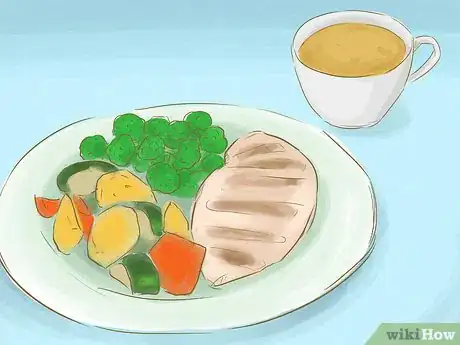

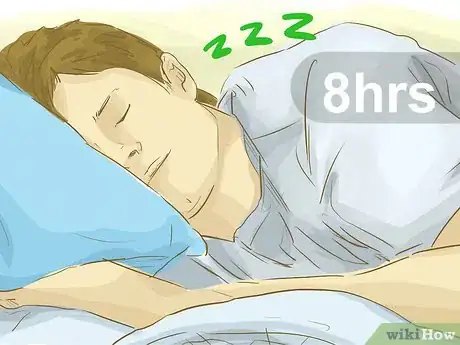
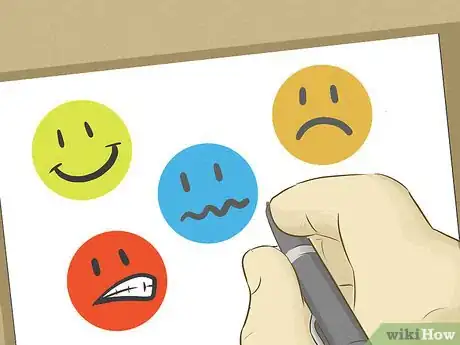


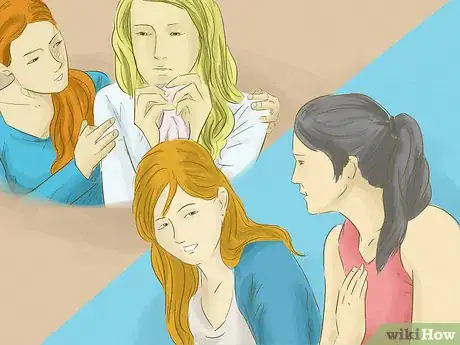




-Step-24.webp)

